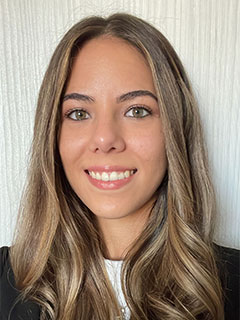HOW CAN WE HELP YOU? Call 1-800-TRY-CHOP
In This Section
Hispanic Heritage Month: Q&A With Featured Research Trainee, Melanie Cruz

The October Featured Research Trainee for Hispanic Heritage Month is Melanie Cruz
Editor's note: For Hispanic Heritage Month, our Featured Research Trainee for October is Melanie Cruz. Cruz is a University of Pennsylvania Post-Baccalaureate Research Education Program (PREP) Research Fellow working in the lab of Judith Grinspan, PhD. Cruz earned her bachelor's of science degree in Chemistry from the University of Puerto Rico, Río Piedras Campus. In this Q&A, Cruz discusses her research and experiences at Children's Hospital of Philadelphia, and the persistence of people with Hispanic heritage to achieve their goals and dreams in the face of inequality.
What message do you hope people take away from Hispanic Heritage Month?

Melanie Cruz
The United States is home to many people who were born elsewhere. Unfortunately, access to science, health, rights, and knowledge is not equal. Hispanics are commonly recognized as resilient and passionate workers, but many don't realize that we are this way because we have had to struggle and make sacrifices to achieve our dreams. It can be easy to forget that what is ordinary for some can be an ideal or a dream for others; however, we must use the resources and opportunities available to help those who do not have them. We must recognize and be empathetic to diversity. Hispanics and other ethnicities are human beings who struggle, work hard, and leave our families and nation of birth to seek equality.
Tell us about your current research and why it is important?
It has been reported that adolescents constitute 21% of new HIV cases. Previous studies have demonstrated that as many as 50% of people with HIV develop neurocognitive disorders and white matter abnormalities referred to as HIV-associated neurocognitive disorder (HAND). Strikingly, the overall prevalence of HAND remains unchanged despite widespread antiretroviral therapy (ART) use, suggesting that either the mechanisms driving HAND are not effectively targeted by ART or that ART contributes to this pathology. This is particularly important in the context of adolescence, when white matter continues to develop.
Dolutegravir is a frontline integrase inhibitor currently approved for use in adolescents with HIV that we can study to determine whether dolutegravir affects white matter integrity. I am currently studying the effect of dolutegravir on oligodendrocyte maturation by employing purified primary cultures of oligodendrocytes, the glial cells of the central nervous system that make myelin in white matter.
What are some of the most salient experiences you've had at CHOP, research or otherwise?
I started at CHOP in June, and it has only taken a few months to be able to say that I am passionate about what I do. I love learning something new every day in the lab. I have been able to develop experiments that are the fruit of my thoughts. Having the hospital nearby inspires me to continue my research. Knowing that what I do in the lab can help the patients I see on campus encourages me to continue working hard to find a solution or treatment for their disease.
Aside from research, what do you consider your biggest accomplishment?
My biggest accomplishment was taking care of my grandfather during his illness while finishing college studies. In my first year of college, Hurricane Maria hit Puerto Rico (where I come from), causing much damage and ensuing political upheaval. During my last year of college, my grandfather became sick, and I dedicated myself to taking care of him, studying, and working. Overcoming these adversities, having the honor of taking care of my grandfather until his last day, finishing my studies, and getting into the Penn PREP program are my most satisfying achievements.
What do you do for fun when you're not working?
In my free time, I take salsa and bachata lessons to exercise and release stress. Also, I like to walk around the Center City and Old City sections of Philadelphia and discover new places to eat.


